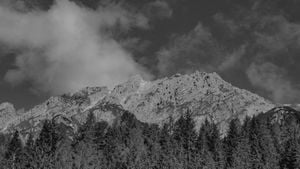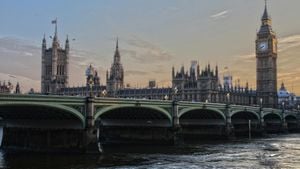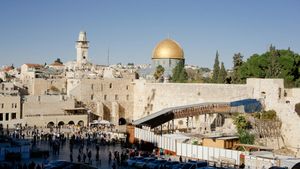Hong Kong is witnessing one of the most significant chapters of its political saga as the sentencing of prominent pro-democracy activists shakes the very foundation of its social fabric. The events unfolded this week, as courts handed down sentences for some of the organizers behind the mass protests and electoral movements aimed at pushing back against Beijing's tightening grip over the territory.
This week, exactly five years after the protests surged, the atmosphere felt heavy with the weight of justice, or perhaps injustice. Thirty-five activists from the 47 arrested during the 2020 pro-democracy protests faced the music, receiving sentences ranging up to life imprisonment. The crackdown embodies the consequences of the national security law imposed by China, which has effectively stifled dissent and turned political aspirations for autonomy and democracy to whispers.
Among those sentenced were key figures such as former lawmakers and scholars, men and women who had boldly espoused Hong Kong’s right to self-governance and democracy. Sending these leaders to prison sends ripples of fear throughout the movement, marking what many critics say is the end of freedom as it was once known. The stakes were particularly high, not only for the individuals involved but for future generations of advocates pursuing policies of reform and change.
Hong Kong has found itself at the crossroads of history, with the hearts and minds of its citizens reckoning with the shadows of their leaders now behind bars. This sentencing follows years of protests against the erosion of civil liberties and the independence Hong Kong once enjoyed. What happens next is shrouded in uncertainty, as the territory continues under the watchful eyes of Beijing.
Yet amid the turmoil and tension, what often goes overlooked is the role of faith among some of these activists. Angela Lu Fulton, Southeast Asia Editor at Christianity Today, highlights how some leaders drew strength from their Christian beliefs, shaping their resolve to fight for freedom and democracy. This was reflected in the hopes they shared during protests, aiming to cultivate not only political change but also moral integrity within their movement.
Fulton recounts how Baptist pastor Chu Yiu-ming, law professor Benny Tai, and sociology professor Chan Kin-man viewed their activism not merely as political but as part of their faith's calling. They believed their commitment to justice aligned with their Christian principles—a poignant reminder of the intersection between faith and activism.
This complex liaison renders their fight for democracy more than just political maneuvering; it becomes, for many, an act of obedience to their faith. Such perspectives have inspired numerous followers within Hong Kong and beyond, emphasizing the moral imperative for justice.
The concerning political climate raises questions about faith and freedom: Can religious belief endure under such oppressive circumstances? Some activists may have sensed their Christian values bolstering their fortitude to face severe penalties, yet their situation remains precarious with the looming threat of harsher legal repercussions under the national security law.
This week’s judicial proceedings signal more than just penalties—they embody the larger suppression of dissent and the calculated effort by the Chinese government to quash any semblance of rebellion or independence. It’s impossible to overlook how pervasive this fear is, with many anticipating the fate of those still outside of prison walls, weighing the risks of speaking out.
Activists and rights advocates around the globe have decried these sentences, reiterative of persistent condemnation for China's human rights violations, particularly against its populace pushing for democratic ideals. Many have labeled the national security law as draconian, describing it as legislation meant to stifle opposition and dissenting voices. Under these circumstances, the pro-democracy movement's survival heavily relies on the public's resilience and the commitment of its leaders to remain steadfast.
The repercussions of these sentences extend far beyond the courtroom. They are symptomatic of Hong Kong's declining freedoms, and increasingly, the population might reconsider their strategy for seeking change. The principles for which these activists fought will continue to echo long after their sentences are served, pushing new generations to devise new methods of resistance.
Even with the external pressures, the flame of hope and determination to challenge oppression continues to flicker, kept alive by those who believe deeply—whether through faith or ideology—that change is both necessary and achievable. Amid the dark clouds gathered over Hong Kong, the quest for justice and democracy remains unhindered, albeit vulnerable. It’s a dynamic struggle, one where faith intertwines with the demands of realpolitik, showing the world how deeply personal convictions can navigate political landscapes.
While the world’s eyes have been on these proceedings, it begs the question—how can the struggle for freedoms continue when faced with overwhelming odds? The answer may lie as much within the personal beliefs of these activists as it does within the global community's determination to uphold human rights. The saga of Hong Kong's battle for democracy is far from over; it is merely entering another chapter of resilience and resolve.



